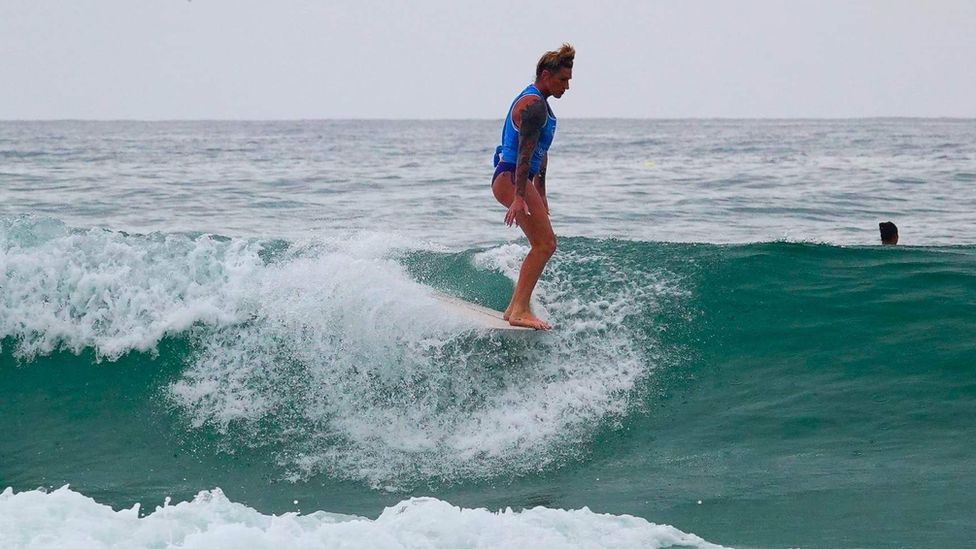 Image source, Sasha Jane Lowerson
Image source, Sasha Jane Lowerson
Australian surfer Sasha Jane Lowerson had entered a longboard competition in Huntington Beach
By Emma Vardy
Los Angeles correspondent
A California surf competition has been told it must allow a transgender woman to compete in the women's division or it will be in violation of state law.
The California Coastal Commission said surf competitions could "not discriminate based on gender".
The contest's organiser had announced that Sasha Jane Lowerson would not be allowed to compete in the Huntington Beach Longboard Pro.
The decision divided opinion, and received hundreds of responses.
Lowerson had entered the women's division of Saturday's competition in Huntington Beach, south of Los Angeles. She said she put herself forward because rules set by the International Surfing Association (ISA) allow transgender women to compete if they meet certain criteria around testosterone levels.
"I was really disappointed and surprised [at being excluded]," she told the BBC. "You can't cherry-pick the rulebook. If you're going to use the rulebook, you use all of it."
Todd Messick, whose American Longboard Association organises the competition, had announced on 25 April that the contest would not allow transgender women to compete in the women's division, saying he wanted to "offer an equal playing field for all athletes".
He told the BBC he was "surprised by the amount of anger" that the decision generated, but added: "What I found too is that there was a lot of people very appreciative of me speaking up."
"For me, I was trying to do the right thing. It wasn't something I ever expected to have to deal with really, not in our little longboard community," he said.
Lowerson - an Australian who previously won men's events in her home country - said she had encountered mostly positive attitudes in the world of competitive surfing when she began living as a woman.
"Three years ago I had just started my transition, and I made a phone call to Surfing Australia," she said. "I was really well-received. They were very forthcoming on being inclusive and being progressive."
Since transitioning, she has contributed to the development of new guidelines adopted by Australia's national governing body allowing transgender women surfers to compete in women's events.
In the US, the issue has proved more contentious. It is also under the spotlight in California, with Los Angeles due to host the Olympic Games in four years' time.
Last year, the World Surf League (WSL) announced a new policy on transgender participation, which allows trans women competitors to compete in women's events if they maintain a testosterone level below a certain limit for at least 12 months. Some professional surfers, including well-known pro Bethany Hamilton, were critical of the new rule, which is based on a policy created by the International Surfing Association.
"Many of the girls currently on tour are not in support of this new rule, and they fear being ostracised if they speak up," Hamilton said at the time. "Is a hormone level an accurate depiction of whether someone is male or female?"
Referring to Hamilton's views, Todd Messick, the longboard competition organiser, added: "90% of the female surfers I spoke to are in agreement, but many haven't commented. It's that sensitive."
Surfers like Hamilton who oppose transgender women participating in the women's argue that they have an unfair strength advantage.
Lowerson, a longboarder, said she did not believe that was the case. "It's not a race, it's about style, flow, grace. As a longboarder, it's more like ballet on a wave," she said, adding that she could prove her testosterone levels are below the required threshold.
The surfer said that despite the furore she would continue to enter women's events. "I've inadvertently become a poster-child for trans women in surfing," she said. "Not that I wanted to do that, but it just kind of happened."
"Sport is about community," she added. "It's about sharing and having fun with other like minded people, and the fact we're losing sight of that is really sad."
According to the California Coastal Commission, local sporting events that do not allow transgender women to compete in female divisions could be shut down.
"Surf contests in state waters must be carried out in a lawful manner that does not discriminate based on gender," spokesman Joshua Smith told the BBC.
A letter to the competition organisers from the coastal agency, seen by the BBC, said that a ban on transgender women from competing "is not consistent with the public access, recreation and environmental justice policies of the Coastal Act".
Mr Messick said he was told that "this went all the way to the California governor's desk". The BBC has approached the office of Governor Gavin Newsom for comment.
There is no consensus between different sporting bodies on what rules should be in place for transgender competitors, and many have been wrestling with how to establish policies.
The international governing body for swimming, World Aquatics, has effectively banned transgender women from competing in top female swimming events.
World cycling's governing body, the UCI, has similarly ruled that transgender women will be prevented from competing in international female events.

 1 week ago
9
1 week ago
9










 English (US) ·
English (US) ·